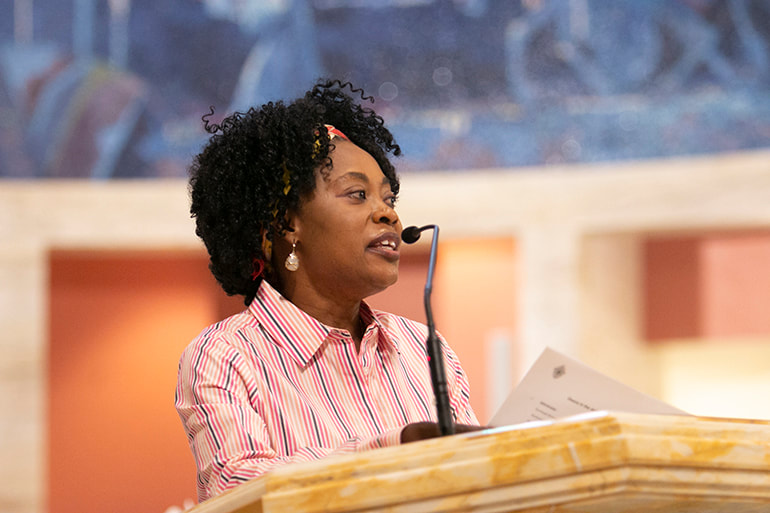Nine Steps to Becoming a Better Lector
By Nick Wagner
READ SCRIPTURE
Read the entire gospel for the given year every Advent
Read all of John's gospel in the summer of year B
Read the gospel for your assigned Sunday
Read all the other readings, including the psalm, for your assigned Sunday
Read the readings for the week before and the week after your assigned Sunday
Read in the Bible what comes before and after your assigned reading
Read the entire letter your reading comes from if you are the second reader
PRACTICE
Practice out loud at least six times
Always practice out loud
Always practice while standing up
Practice on at least two different days other than the Sunday you read. Practice in front of a mirror
Practice with a tape recorder
Practice with a video camera
Practice in front of your children or grandchildren
Read the entire gospel for the given year every Advent
Read all of John's gospel in the summer of year B
Read the gospel for your assigned Sunday
Read all the other readings, including the psalm, for your assigned Sunday
Read the readings for the week before and the week after your assigned Sunday
Read in the Bible what comes before and after your assigned reading
Read the entire letter your reading comes from if you are the second reader
PRACTICE
Practice out loud at least six times
Always practice out loud
Always practice while standing up
Practice on at least two different days other than the Sunday you read. Practice in front of a mirror
Practice with a tape recorder
Practice with a video camera
Practice in front of your children or grandchildren
PRAY
Read the Gospel as your Sunday night prayer the week before you read
Read your reading as your morning prayer at least twice before you read
Pray for the Spirit to open the ears of those who will hear your reading
Pray for the strength to put aside your own ego and for the Spirit to speak through you
FIND THE EMOTION
Discover the primary emotion in the reading
Recall times when you have felt that emotion
Try to recall that emotion in yourself as you practice the reading
FIND THE MOST IMPORTANT PHRASE
Underline the most powerful, most interesting, or most disturbing ideas in the reading
Read the gospel again, and discern its main idea
Read your reading again, focusing on the underlined parts
Choose the most important phrase in the reading and emphasise it in such a way that it is clear to everyone in the assembly. Use rhythm and silence to do this
USE EYE CONTACT
Always look at the assembly for a long time before you begin to read
Use your finger or an index card to keep your place
Always use eye contact on the opening and closing sentences
Make eye contact on words and phrases that reveal the key emotion.
Make eye contact on the most important phrase
PROJECT
Fill your lower air cavity first, then your upper air cavity. Use the air from the lower cavity first
Use your diaphragm instead of your throat
Do not rely on the microphone
Control your breathing
Make sure you feel your stomach muscles moving
VARY YOUR PACE
Almost every reading has fast parts and slow parts
Most readings have loud parts and quiet parts
Some readings call for clipped, staccato rhythm; others call for smooth, melodic rhythm
VARY YOUR STYLE
Some readings read like stories
Some readings are prophesies
Some readings are read like a news report
Some readings are poetry
The season of the church year will also require a shift in style
Different assemblies require different styles
Fill your lower air cavity first, then your upper air cavity. Use the air from the lower cavity first
Use your diaphragm instead of your throat
Do not rely on the microphone
Control your breathing
Make sure you feel your stomach muscles moving
VARY YOUR PACE
Almost every reading has fast parts and slow parts
Most readings have loud parts and quiet parts
Some readings call for clipped, staccato rhythm; others call for smooth, melodic rhythm
VARY YOUR STYLE
Some readings read like stories
Some readings are prophesies
Some readings are read like a news report
Some readings are poetry
The season of the church year will also require a shift in style
Different assemblies require different styles
Nick Wagner is the codirector and cofounder of TeamRCIA.com, a free online resource for catechumenate ministry, and is a leading voice and trainer in Catholic liturgical and catechetical ministries.
Images from Unsplash and Pixabay. Used under license/with permission.




